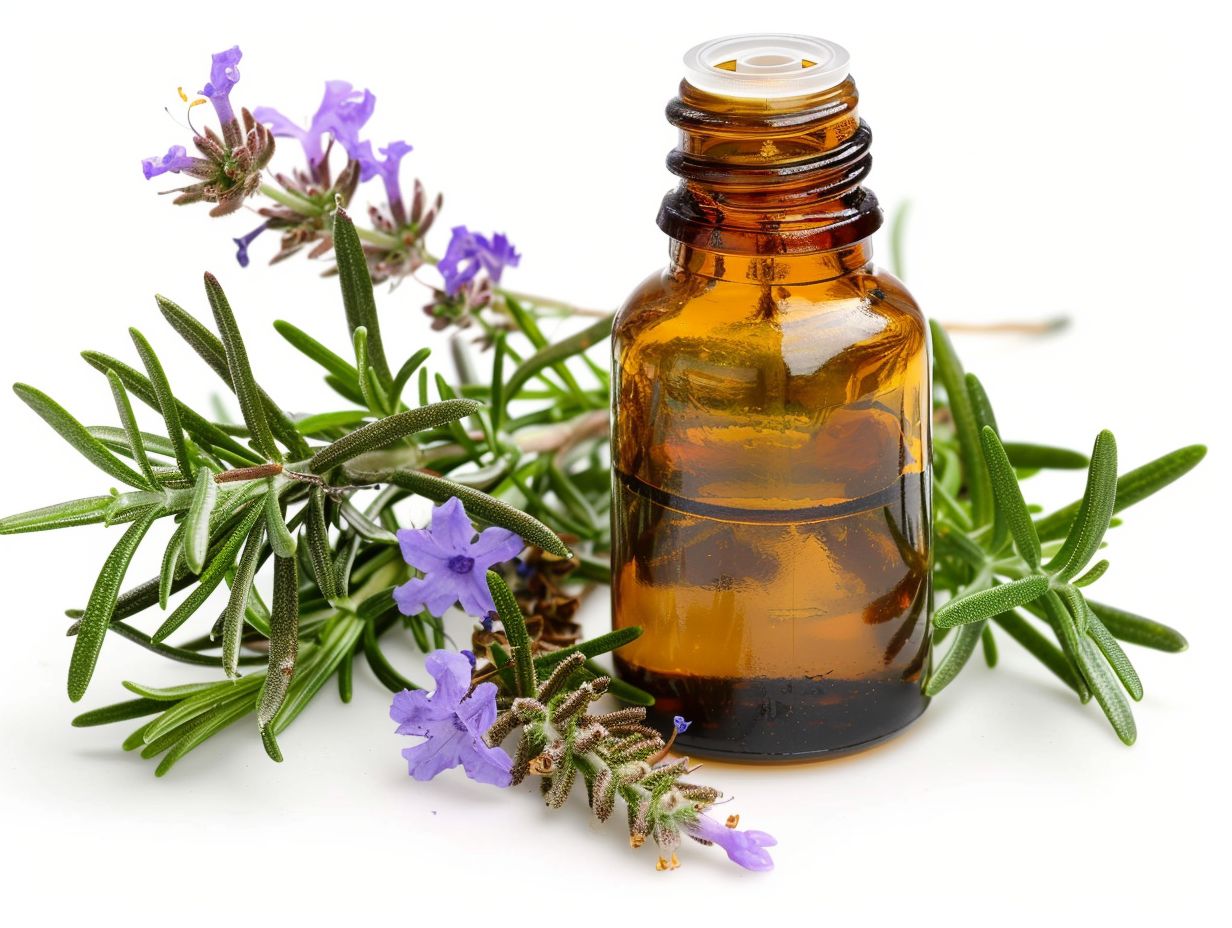Does Rosemary Essential Oil Block Dht
Have you ever heard of DHT and its effects on the body? Are you curious about the potential benefits of using Rosemary Essential Oil to block DHT?
In this article, we will explore the relationship between DHT and the body, the active compounds in Rosemary Essential Oil, and whether it can effectively block DHT.
We will also discuss the results of recent studies, the potential benefits of using Rosemary Essential Oil for hair loss, any possible side effects or risks, and the different ways it can be used.
Let’s dive in and learn more about this natural remedy.
Key Takeaways:
What is DHT?
DHT, or dihydrotestosterone, is a hormone derived from testosterone that plays a crucial role in the development of male characteristics, affecting hair follicles and contributing to conditions such as male pattern baldness.
DHT, being a potent form of testosterone, binds to androgen receptors on hair follicles, leading to a process called miniaturization where the affected hair follicles shrink over time.
This gradual shrinking weakens the hair growth cycle, resulting in finer, shorter hairs that eventually cease to grow, leading to the characteristic pattern of hair loss commonly seen in male pattern baldness.
The accumulation of DHT in the scalp is believed to disrupt the normal hair growth cycle, causing hair to become thinner and eventually stop growing altogether.
What are the Effects of DHT on the Body?
The effects of DHT on the body primarily focus on the scalp and hair follicles, leading to conditions such as hair loss, particularly in cases of androgenetic alopecia or male pattern baldness.
When DHT attaches to hair follicles, it can shrink them and shorten the hair growth cycle, leading to finer and shorter hair strands. This process is known as miniaturization, which gradually results in the thinning of the hair and eventually in baldness. DHT not only affects the scalp but can also impact other areas with hair follicles, leading to unwanted body and facial hair in some individuals. Understanding the role of DHT is crucial in combating hair loss and addressing concerns related to androgenetic alopecia.
What is Rosemary Essential Oil?
Rosemary essential oil is an aromatic essential oil derived from the rosemary plant, widely used in aromatherapy and various traditional remedies for its therapeutic properties.
Known for its invigorating scent and herbal charm, rosemary essential oil has been utilized for centuries, dating back to ancient civilizations such as the Egyptians, Greeks, and Romans. In aromatherapy, this oil is prized for its ability to enhance mental clarity, promote relaxation, and alleviate stress.
Rosemary essential oil is renowned for its antimicrobial and antioxidant properties, making it a popular ingredient in natural skincare products and medicinal applications. Whether diffused, inhaled, or applied topically with a carrier oil, rosemary oil continues to captivate enthusiasts with its multifaceted benefits.
How Does Rosemary Essential Oil Work?
Rosemary essential oil works by promoting hair growth and potentially targeting male pattern baldness through its active compounds that interact with the scalp and hair follicles.
One of the key components in rosemary essential oil is ursolic acid, which helps to increase scalp circulation, promoting nutrient delivery to the hair follicles and stimulating hair growth. Additionally, carnosic acid in rosemary oil has antioxidant properties that protect the scalp from free radical damage, contributing to a healthier environment for hair growth.
- Other essential oils like lavender and peppermint often complement rosemary oil in hair growth formulas, enhancing its effectiveness by supporting scalp health and encouraging follicle stimulation. These oils work synergistically to create an optimal environment for strong and healthy hair.
Studies have shown that the anti-inflammatory properties of rosemary essential oil can help combat conditions like dandruff and dermatitis, which often contribute to hair loss. By reducing inflammation on the scalp, rosemary oil promotes better hair growth and overall hair health.
What are the Active Compounds in Rosemary Essential Oil?
Rosemary essential oil contains active compounds that have been studied for their potential effects on 5-alpha-reductase, an enzyme linked to hair loss and the conversion of testosterone to DHT.
In particular, one of the key compounds in rosemary essential oil is Rosmarinic acid, which has shown inhibitory effects on 5-alpha-reductase. This enzyme plays a crucial role in the development of androgenetic alopecia by converting testosterone into dihydrotestosterone, a potent androgen responsible for hair follicle miniaturization.
Another important component is Carnosic acid, known for its antioxidative properties and potential anti-inflammatory effects, making it a promising candidate for combating hair loss. These compounds work synergistically to target the underlying mechanisms implicated in male pattern baldness.
Does Rosemary Essential Oil Block DHT?

One study published in the Journal of Phytotherapy Research found that rosemary essential oil demonstrated inhibitory effects on 5 -reductase, an enzyme responsible for converting testosterone into DHT. This inhibition could potentially help reduce DHT levels, which is crucial in conditions like hair loss.
A clinical trial conducted at the University of Maryland Medical Center revealed that participants using rosemary essential oil experienced a significant decrease in DHT levels after regular application.
What Studies Have Been Done on the Effects of Rosemary Essential Oil on DHT?
Several studies have been conducted to evaluate the effects of rosemary essential oil on DHT levels, exploring its potential as a treatment for conditions related to hormonal imbalances.
One study published in the International Journal of Endocrinology and Metabolism reported that rosemary essential oil exhibited anti-androgenic properties, which could help reduce DHT levels in the body.
Another research conducted by the Journal of Medicinal Food indicated that the components in rosemary oil may inhibit the enzyme responsible for converting testosterone into DHT.
These findings suggest that the use of rosemary essential oil could be beneficial in managing conditions such as hair loss, acne, and prostate issues linked to elevated DHT levels.
How Does Rosemary Essential Oil Compare to Other DHT Blockers?
In comparisons with conventional DHT blockers like finasteride, rosemary essential oil offers a natural alternative with potentially fewer side effects and complementary benefits.
While finasteride is commonly used for treating hair loss by inhibiting the production of dihydrotestosterone (DHT), it may have side effects like sexual dysfunction and mood changes. On the other hand, rosemary essential oil contains antioxidants that can promote scalp circulation and stimulate hair growth without the same risk of hormonal imbalances.
The pleasant aroma of rosemary essential oil can provide a soothing and calming effect, unlike the chemical scent of some conventional medications. This natural alternative is known for its anti-inflammatory properties, which can benefit scalp health and overall hair quality.
What are the Potential Benefits of Using Rosemary Essential Oil to Block DHT?
The potential benefits of using rosemary essential oil to block DHT include promoting hair growth, providing antioxidants to the scalp, and potentially reducing inflammation associated with hair follicle damage.
Rosemary essential oil is rich in anti-inflammatory properties that can help combat scalp irritations and improve circulation, which is crucial for healthy hair growth. Its antioxidant content assists in protecting the hair follicles from oxidative stress, thereby supporting overall hair health.
By effectively blocking DHT, rosemary essential oil aids in preventing hair loss and encouraging new hair follicle growth. Its stimulating effects on the scalp not only boost hair thickness but also enhance shine, making it a popular choice for those seeking natural remedies for hair care.
Can Rosemary Essential Oil Help with Hair Loss?
Rosemary essential oil has shown promise in helping with hair loss, especially when combined with other beneficial oils like pumpkin seed oil, which enhance its effects on scalp health and hair growth.
When used in conjunction with pumpkin seed oil, the blend of these oils can work synergistically to deeply nourish the scalp, promote blood circulation, and improve hair follicle strength. The antimicrobial properties of rosemary oil help in maintaining a healthy scalp environment, reducing dandruff, and preventing any potential infections that may impede hair growth. The stimulating effect of these oils can enhance the production of new hair cells, contributing to thicker and healthier hair over time.
Does Rosemary Essential Oil Have Other Health Benefits?
Beyond its impact on hair health, rosemary essential oil offers additional health benefits, including the provision of essential vitamins and nutrients that support overall well-being.
Rich in antioxidants, rosemary essential oil is a powerhouse of nutrients like iron, calcium, and vitamin B6.
These components play a vital role in enhancing immune function, promoting cardiovascular health, and supporting cognitive function.
The anti-inflammatory properties of rosemary essential oil may help alleviate pain, reduce inflammation, and contribute to overall pain management.
Are There Any Side Effects or Risks of Using Rosemary Essential Oil to Block DHT?

While generally considered safe for topical use, using rosemary essential oil to block DHT may have potential side effects, especially for individuals sensitive to certain components like lycopene.
One of the main risks associated with rosemary essential oil is the potential for skin irritation and allergic reactions due to its concentrated nature. It is advised to perform a patch test before widespread use to check for any adverse reactions.
Inhaling large amounts of rosemary oil vapor may lead to respiratory issues in some individuals. Pregnant women should exercise caution as excessive use of certain essential oils, including rosemary, has been linked to potential complications during pregnancy. Consultation with a healthcare professional is recommended before incorporating rosemary essential oil into a daily regimen.
How Can Rosemary Essential Oil Be Used to Block DHT?
Rosemary essential oil can be used to block DHT both topically and potentially through ingestion, with topical application being a common method along with complementary ingredients like nettle root extract.
When utilizing rosemary essential oil topically for DHT inhibition, it is advisable to dilute it with a carrier oil like coconut or almond oil to prevent skin irritation. Mixing a few drops of rosemary oil with the carrier oil and massaging it into the scalp can help promote blood circulation and stimulate hair follicles.
For those considering ingestion, it is essential to consult a healthcare professional before using rosemary oil internally. Incorporating rosemary oil in cooking or as a supplement might provide additional benefits due to its antioxidant properties.
Can Rosemary Essential Oil Be Used Topically?
Topical application of rosemary essential oil on the scalp can be an effective way to target DHT locally, providing amino acids and nutrients directly to hair follicles for potential growth stimulation.
When applied to the scalp, rosemary essential oil works by improving blood circulation, which in turn enhances the delivery of nutrients to the follicles. This boost in circulation not only aids in nutrient delivery but also helps in removing DHT buildup, which can contribute to hair loss. The anti-inflammatory properties of rosemary essential oil can soothe the scalp, promoting a healthier environment for hair growth. By incorporating this natural remedy into your hair care routine, you may experience improved scalp health and potentially enhanced hair growth.
Can Rosemary Essential Oil Be Ingested?
While topical application is common, some studies suggest that ingesting rosemary essential oil, alongside compounds like biotin, may also offer benefits in managing DHT levels internally.
Research has indicated that rosemary essential oil contains compounds that can help inhibit the enzyme responsible for converting testosterone into DHT, a key factor in hair loss.
The combination of rosemary essential oil with biotin, a B vitamin known for promoting hair growth and overall scalp health, could potentially enhance the effectiveness of DHT regulation.
Conclusion
In conclusion, rosemary essential oil shows promising potential as a natural treatment option for blocking DHT and addressing hair loss concerns, backed by research and ongoing clinical trials that highlight its efficacy and safety profile.
Studies have demonstrated that the active compounds in rosemary essential oil may help inhibit the enzyme responsible for converting testosterone into DHT, a hormone linked to hair loss.
The antioxidant properties of rosemary oil can promote scalp health, stimulate hair follicles, and improve blood circulation, fostering an optimal environment for hair growth.
The anti-inflammatory effects of rosemary essential oil play a vital role in maintaining a healthy scalp and potentially reducing conditions that contribute to hair thinning.
Frequently Asked Questions
Does Rosemary Essential Oil Block Dht?

How does Rosemary Essential Oil block DHT?
Rosemary Essential Oil contains compounds that inhibit the activity of 5-alpha-reductase, the enzyme responsible for converting testosterone into DHT.
Is there scientific evidence to support Rosemary Essential Oil’s effectiveness in blocking DHT?
Yes, several studies have shown that Rosemary Essential Oil can effectively inhibit 5-alpha-reductase activity and reduce DHT levels in the scalp.
Can Rosemary Essential Oil be used as a treatment for pattern baldness?
While more research is needed, some studies have shown that Rosemary Essential Oil can improve hair growth and thickness in individuals with pattern baldness, likely due to its ability to block DHT.
How should Rosemary Essential Oil be used for blocking DHT?
Rosemary Essential Oil can be diluted with a carrier oil and massaged into the scalp, or added to hair care products such as shampoos and conditioners. It is important to patch test before using, as some people may be sensitive to essential oils.
Are there any potential side effects of using Rosemary Essential Oil to block DHT?
While generally considered safe, some people may experience skin irritation or other allergic reactions when using Rosemary Essential Oil. It is always recommended to consult with a healthcare professional before using any new treatment.








One Comment